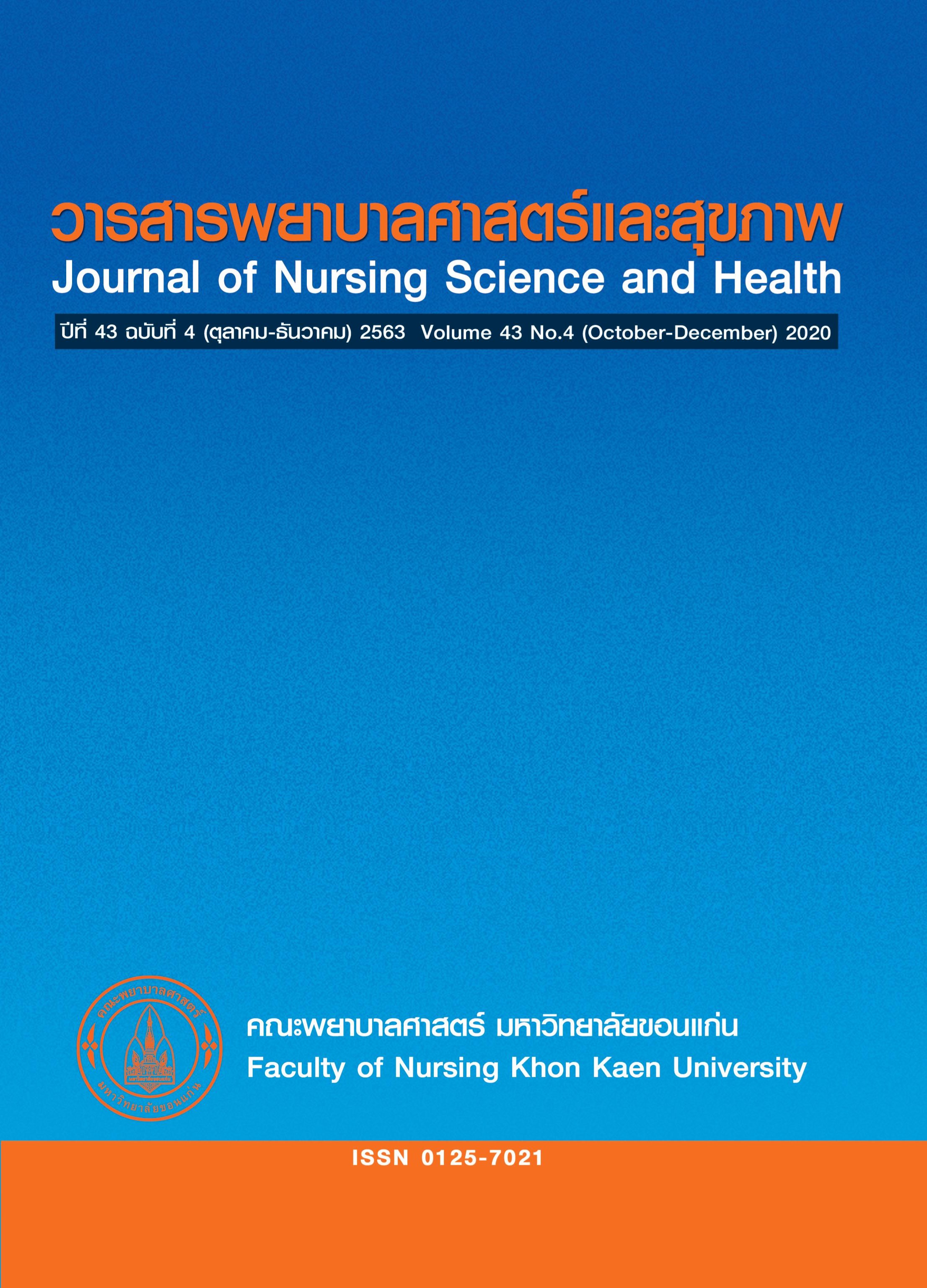ผู้สูงอายุที่เลี้ยงหลานในวัยรุ่นในยุคปัจจุบัน
คำสำคัญ:
ผู้สูงอายุ, เลี้ยงหลาน, วัยรุ่น, ยุคปัจจุบันบทคัดย่อ
การวิจัยเชิงปรากฏการณ์วิทยาเชิงตีความนี้ มีวัตถุประสงค์เพื่อศึกษาประสบการณ์ชีวิตของผู้สูงอายุที่เลี้ยงหลานวัยรุ่นในครอบครัวข้ามรุ่น โดยเลือกกลุ่มผู้ให้ข้อมูลหลักแบบเจาะจง เป็นผู้สูงอายุที่เลี้ยงหลานวัยรุ่นในครอบครัวข้ามรุ่นตามเกณฑ์การคัดเข้า จำนวน 21 คน ในพื้นที่ 3 อำเภอของจังหวัดนครราชสีมา เก็บข้อมูลเป็นเวลา 8 เดือน ตั้งแต่เดือนกุมภาพันธ์ ถึง เดือนกันยายน พ.ศ 2562 โดยการสัมภาษณ์เชิงลึก บันทึกภาคสนาม และสังเกตแบบไม่มีส่วนร่วม จากนั้นวิเคราะห์ข้อมูลเชิงคุณภาพด้วยวิธีการของไดเคลแมน และอัลเลน 7 ขั้นตอน หลังจากนั้นตรวจสอบความเชื่อถือได้ของข้อมูล ผลการศึกษา: ได้แก่นความคิดหลัก 6 แก่น ได้แก่ 1) มีหลานเป็นที่พึ่ง 2) ถูกทำร้ายร่างกายและจิตใจ 3) ผิดหวังและอับอาย 4) เลี้ยงไม่จบไม่สิ้น 5) การไม่เข้าใจกัน 6) ตามไม่ได้ไล่ไม่ทัน โดยผู้สูงอายุส่วนใหญ่ประสบกับปัญหาทั้งสุขภาพกายและจิตใจ แต่ผู้สูงอายุพยายามที่จะดำรงบทบาทของครอบครัวไว้ด้วยความรักที่มีต่อบุตรหลาน ข้อเสนอแนะ พยาบาลครอบครัวควรให้การพยาบาลเชิงรุก ในการค้นหาปัญหาในครอบครัวข้ามรุ่นที่ผู้สูงอายุเลี้ยงหลานในวัยรุ่น เพื่อป้องกันความรุนแรงในครอบครัว และการตั้งครรภ์ในวัยรุ่น
เอกสารอ้างอิง
Institute for Population and Social Research Mahidol University. Population of Thailand, B.E.2015. Mahidol Population Message 2015; 24: 1-2. (in Thai)
United Nations (2015). World Population Prospects: the 2015 Revision. (New York). Avialable from: https://population.un.org/wpp/Publications/Files/WPP2015_ DataBooklet.pdf
Morrow-Howell N, Wang Y. Productive engagement of older adults: Elements of a cross-cultural research agenda. Aging Int 2013;38:159-70.
Presser HB. Working in a 24/7 economy: Challenges for American families. 2004; New York: Russell Sage Foundation.
Prachoubmoa W. Project for monitoring and evaluating the implementation of the plan The National Elderly, 2nd Edition (2002 - 2021) Phase 2 (2007-2011). Presentation at the 2014 Academic conference, Office of the promotion and protection of the underprivileged children and youth and elderly. Bangkok; 2014. (in Thai)
Dachakup Y. Parents warning to not sent a small children to live in up-country; 2008. Available from: http://news.swu.ac.th/newsclips/type_activity. (in Thai)
Piyasil V. Family and teenagers. Bangkok: Office of women's affairs and family institution; 2003. (in Thai)
Abas MA, Punpuing S, Jirapramukpitak T. Psychological wellbeing, physical impairments and rural aging in a developing country setting. Health Qual Life Outcomes 2009;7(66):1-9.
Minkler M, Fuller-Thomson E. The health of grandparents raising grandchildren: results of a National study. Am J of Public Health 1999; 89(9):1384-89.
Sloan A, Bowe B. Phenomenology and hermeneutic phenomenology: the philosophy, the methodologies, and using hermeneutic phenomenology to investigate lecturers’ experiences of curriculum design. Quality & Quantity 2014;48: 1291–303.
Diekelmann N, Allen D. A hermeneutic analysis of the NLN’s criteria for the appraisal of the baccalaureate programs. National League for Nursing; 1989. New York.
Forero R, Nahidi S, De Costa J. Application of four-dimension criteria to assess rigour of qualitative research in emergency medicine. BMC Health Serv Res; 2018;18(1):120. Published 2018 Feb 17. doi:10.1186/s12913-018-2915-2
Tripatee S. Development and adjustment in adolescents; 2013. [cited 2018 May 18]. Available from: http://www.xn--72c5bt4aq4a6bcb2n.net/. (in Thai)
Nuntamungkolchai S, Mansavangsap C, Tachabunsermsak P, Paowattana A. Research report on the happiness and way of life of female elders raising grandchildren in rural areas of northern Thailand. Bangkok: Withoon Printing Co., Ltd (1997); 2010. (in Thai)
Soonthornthada A, Lertchaipet S. The reduce in family during for three generation in Thai society: policy implications. Popul society 2009: 90-103. (in Thai)
Jongudomkarn D, Phuphaibul R, Kumhom R, Dachakup J, Wacharasin C, et al. Perceptions of the Thai family well-Being: A qualitative study. Journal of Nursing Science & Health 2017; 40(1):14-29. (in Thai)
Teanlai K, Hutapat W. The situation of raising children in the skipped-generations family in Thailand. Mahidol University; 2015. (in Thai)
Ketman P. Adolescent development; 2018. Retrived from www.psyclin.co.th May, 10 2018.
Santhan K. Migration process of Thai-traditional women massager from ISAN rural. Khon Kaen. Graduate School. Khon Kaen University; 2011.
Wannasiri T, Prachakkulwong S. The development relationship of adolescent and elderly in the family of Phrong Maduea Community. J R Spatial Dev 2016; 8(1): 100-15. (in Thai)
Ketpichayawattana C, Wiwatwanich S. Violence in Thai elderly: A review of knowledge and the current situation. Bangkok: Foundation of Thai Gerontology Research and Development Institute; 2009. (in Thai)
Kamthon L, Suppasir C. The results of the prevention campaign unwanted pregnancy of teenagers in educational institutions in Trang Province towards sexual values sexual risk behavior and premature sexual intercourse that may lead to unwanted pregnancy. Boromarajonani College of Nursing, Trang. Trang province; 2013. (in Thai)
Jongudomkarn D, Phuphaibul R, Neamsup T. Isan family well-being: Suffering and happiness on poverty. Journal of Nursing Science & Health; 2019; 42(2): 62-73. (in Thai)
Saenjit K. Look after and face. Communication between generations: social media and the possibility of bonding. J Com Arts Inn, NIDA; 2016; 3(2): 47-62. (in Thai)
Srinon R. A causal model of well-being among grandmothers raising grandchildren of their adolescent daughters. Faculty of nursing, Burapha University; 2005.
Saxena D, Sander GF. (2009). Quality of Grandparent-grandchild relationship in Asian-Indian immigrant families. Int J of Aging Hum Dev; 2009; 68(4): 321-37.
Phuphaibul R, Kumhom R, Jongudomkarn D, Wacharasin C, Neamsup T, Dachakup J. Integrative Thai family study based on family life cycle. Putcharaporn Putamonton Nachonpratum; 2019. (in Thai)
ดาวน์โหลด
เผยแพร่แล้ว
รูปแบบการอ้างอิง
ฉบับ
ประเภทบทความ
สัญญาอนุญาต
วารสารพยาบาลศาสตร์และสุขภาพเป็นเจ้าของลิขสิทธิ์ในการเผยแพร่ผลงานที่ตีพิมพ์ห้ามผู้ใดนำบทความที่ได้รับการตีพิมพ์ในวารสารพยาบาลศาสตร์และสุขภาพไปเผยแพร่ในลักษณะต่าง ๆ ดังนี้ การนำบทความไปเผยแพร่ออนไลน์ การถ่ายเอกสารบทความเพื่อกิจกรรมที่ไม่ใช่การเรียนการสอน การส่งบทความไปตีพิมพ์เผยแพร่ที่อื่น ยกเว้นเสียแต่ได้รับอนุญาตจากวารสารพยาบาลศาสตร์และสุขภาพ



